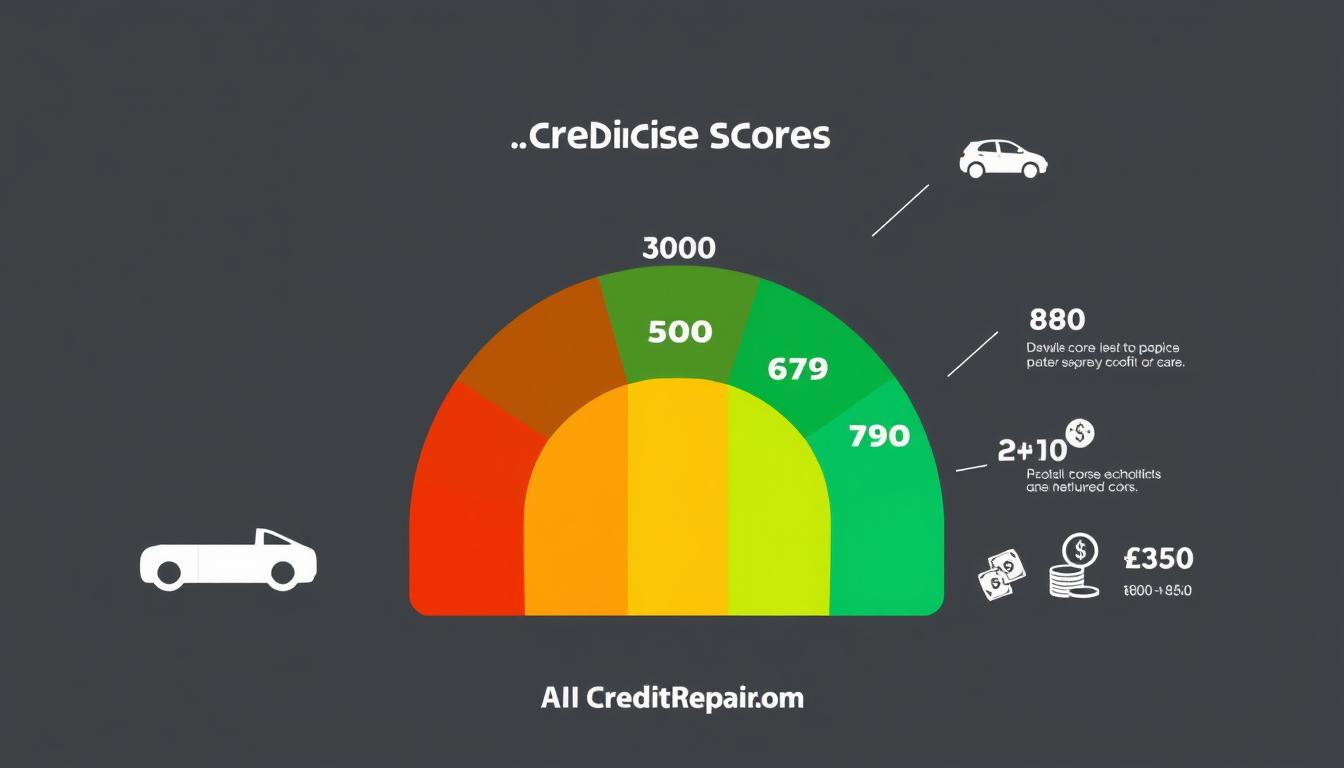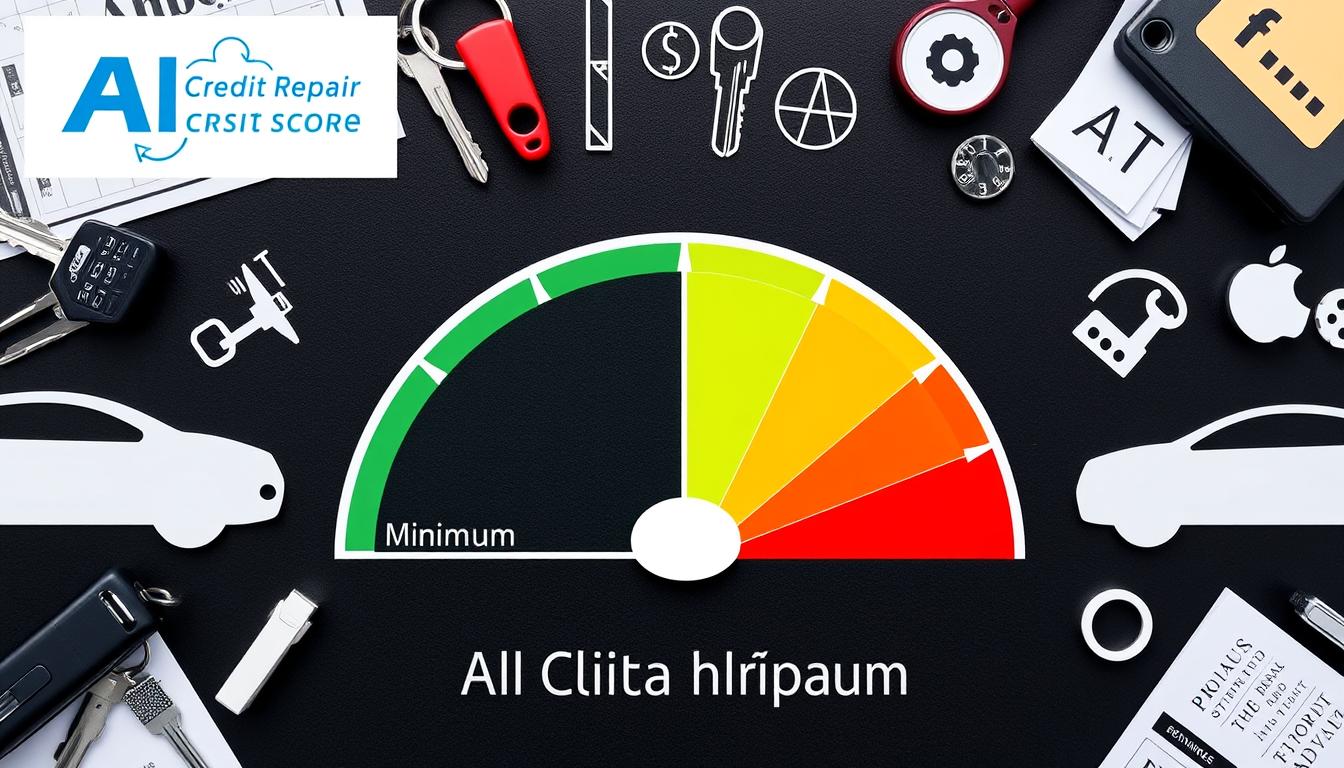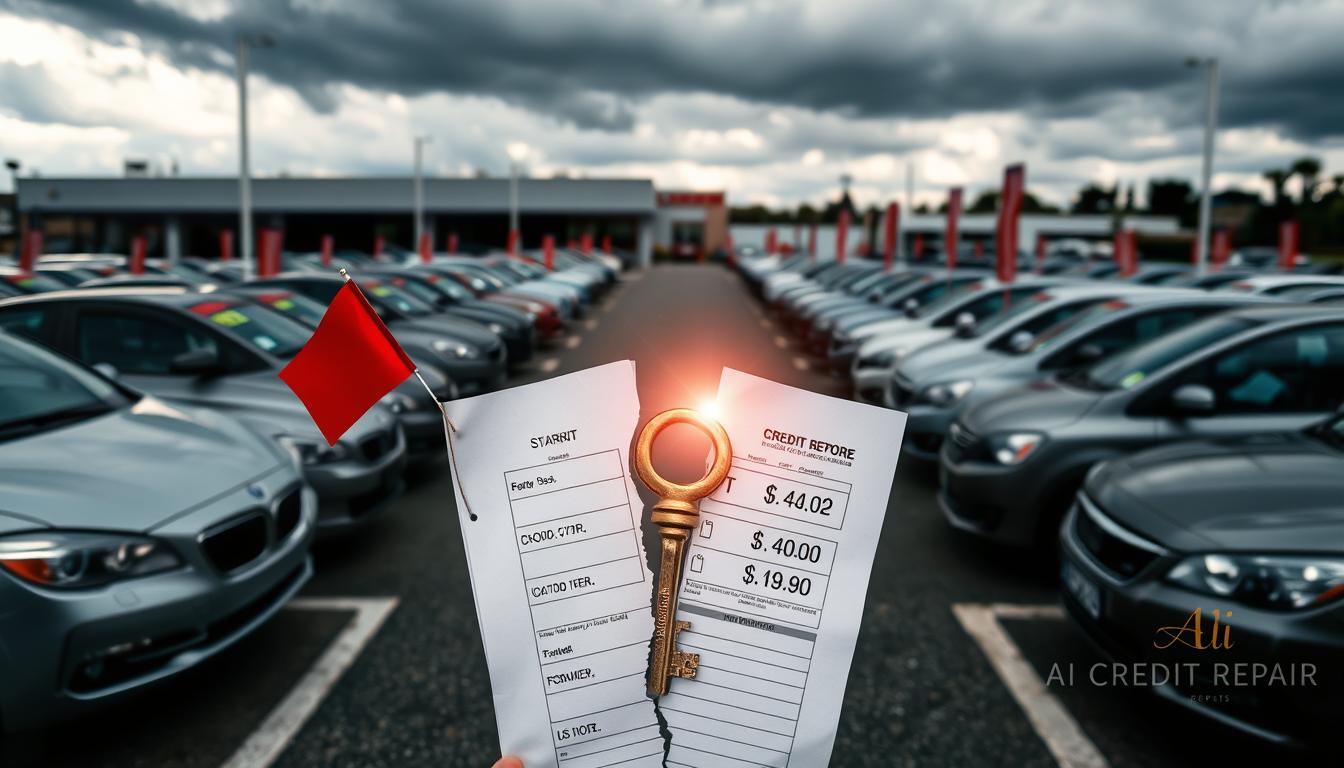Car dealerships consider your credit score when you’re buying a new car. This number ranges from 300 to 850. It reflects your creditworthiness and affects your loan terms.
Understanding dealerships’ credit score preferences can help you prepare. It can improve your chances of getting the best deal. Knowing this information empowers you to make informed decisions.
Key Takeaways
- Dealerships primarily focus on your FICO credit score to assess your creditworthiness for an auto loan.
- Your credit score range can significantly impact the interest rate and loan terms you qualify for, with higher scores resulting in more favorable financing options.
- Knowing the minimum credit score requirements for dealerships can help you determine if you’re likely to be approved for financing or if you need to work on improving your credit before shopping for a car.
- Negotiating with dealerships based on your credit score can give you an advantage in securing the best possible financing terms.
- Exploring special financing options, such as subprime lending or buy here, pay here dealerships, may be an option for those with lower credit scores.
Understanding Credit Scores and Their Importance
A credit score shows how trustworthy you are with money. This number, from 300 to 850, helps lenders decide if they should give you credit. Landlords and employers also use it to assess risk.
What is a Credit Score?
Your credit score comes from your financial history. It looks at how you’ve handled money in the past. The FICO score, made by Fair Isaac Corporation, is the most common type.
Factors Affecting Your Credit Score
Several things shape your credit score. These include how you pay bills and use credit.
- Payment History: How consistently you have made on-time payments for your credit accounts.
- Credit Utilization: The amount of credit you are using compared to your total available credit.
- Length of Credit History: The duration for which you have maintained active credit accounts.
- Types of Credit Used: The mix of different credit accounts, such as credit cards, loans, and mortgages.
- New Credit Inquiries: The number of recent applications for new credit, which can temporarily impact your score.
Knowing these factors helps you improve your financial standing. It’s key to managing your credit well.
“Your credit score is a reflection of your financial responsibility and creditworthiness. It’s important to actively manage and monitor your credit to achieve your financial goals.”
Credit Score Ranges Used by Dealerships
Your credit score is vital when getting an auto loan. Dealerships often use the FICO credit score model. Here’s a general overview of credit tiers many dealerships use:
- Excellent credit: 760-850
- Good credit: 700-759
- Fair credit: 640-699
- Poor credit: 639 and below
Knowing these credit score ranges for car loans helps you understand your position. “Excellent” and “good” scores often qualify for the best rates. “Fair” and “poor” scores may face higher rates or financing challenges.
| Credit Score Range | Financing Implications |
|---|---|
| 760-850 (Excellent) | Qualify for the best interest rates and loan terms |
| 700-759 (Good) | Eligible for favorable interest rates and loan terms |
| 640-699 (Fair) | May face higher interest rates or more limited financing options |
| 639 and below (Poor) | Likely to encounter challenges in securing financing or may only qualify for subprime lending |
These credit score ranges for car loans can guide your car shopping. Knowing your score helps you negotiate with dealerships. You can make smart choices and improve your score if needed.

The Impact of Your Credit Score on Financing
Your credit score greatly influences your auto loan terms. Higher scores often lead to better interest rates. Lower scores may result in higher rates or approval difficulties.
A score of 760 or above typically qualifies for the best rates. This makes a significant difference in your overall vehicle costs.
Interest Rates and Credit Scores
Higher credit scores usually mean lower interest rates on car loans. Lenders see these borrowers as less risky. They offer more favorable financing options to those with excellent credit.
Poor credit may lead to much higher interest rates. This can substantially increase the total cost of your vehicle purchase.
Loan Term Options and Credit Scores
Your credit score affects the length of loan terms available to you. Higher scores often allow for longer repayment periods. This lets borrowers spread out their payments over more time.
Lower scores might limit you to shorter loan terms. This can result in higher monthly payments for your car loan.
| Credit Score Range | Typical Interest Rate | Loan Term Options |
|---|---|---|
| 760-850 (Excellent) | 3.5% – 5.5% | 36 – 72 months |
| 700-759 (Good) | 5.5% – 7.5% | 36 – 60 months |
| 600-699 (Fair) | 7.5% – 12% | 36 – 48 months |
| 500-599 (Poor) | 12% – 18% | 36 – 42 months |
Knowing how credit scores affect car loans is vital for budgeting. This knowledge helps you prepare for your next vehicle purchase. It also aids in negotiating better rates and terms with dealerships.
Minimum Credit Score Requirements for Dealerships
Financing a car often hinges on your credit score. Most dealerships have their own guidelines for minimum scores. These can vary widely between different car sellers.
Many dealerships work with borrowers who have credit scores of 660-680 or higher. Lower scores may still get approval. However, this often means higher interest rates and fewer financing options.
- The minimum credit score to buy a car at most dealerships is around 660-680.
- Borrowers with scores below 660 may still be approved, but they may encounter higher dealership credit score requirements and fewer financing choices.
- It’s crucial to research and understand the individual credit score requirements of the dealerships you’re considering before embarking on your car-buying journey.
“Understanding the minimum credit score requirements can help you better prepare and negotiate with dealerships during the car-buying process.”
Knowing typical minimum credit score to buy a car helps you prepare better. It allows you to negotiate effectively with dealerships. You can make smarter choices when buying your next vehicle.

What Credit Score Do Dealerships Look At?
Car dealerships mainly look at your FICO credit score when you apply for an auto loan. This score ranges from 300 to 850. A higher score shows you’re less of a credit risk.
The FICO credit score helps dealers decide if you’re creditworthy. It affects your interest rate, loan terms, and approval chances. Knowing the score ranges can help you prepare better for buying a car.
The FICO Credit Score Ranges that Dealerships Use
- Excellent credit: 760-850
- Good credit: 700-759
- Fair credit: 640-699
- Poor credit: 500-639
- Very poor credit: 300-499
Dealerships see a FICO score of 700 or higher as excellent credit. This score can get you the best loan terms and rates. Scores below 640 are often seen as poor credit.
Poor credit can lead to higher interest rates. It can also make it harder to get approved for financing.
“Understanding the credit score ranges used by dealerships is crucial in preparing for the car-buying process and improving your chances of securing the best financing options.”
Knowing about credit scores used by auto dealers can help you improve your credit. It can also help you negotiate better terms when buying a car.
This knowledge could save you thousands of dollars in interest over your auto loan’s life.
Improving Your Credit Score Before Car Shopping
Boost your credit score before buying a car. This increases your chances of getting a better car loan. You’ll likely get a lower interest rate and better loan terms.
Tips for Boosting Your Credit Score
Here are some effective strategies to help raise your credit score before buying a car:
- Pay down existing debt: Focus on paying off credit card balances and other outstanding debts. This helps improve your credit utilization ratio, which is a significant factor in your credit score calculation.
- Correct credit report errors: Carefully review your credit report and dispute any inaccuracies or errors. This can be an effective way to quickly boost your credit score.
- Avoid new credit inquiries: Limit your applications for new credit. Each inquiry can temporarily lower your credit score. This helps maintain your credit history and score when improving your credit score for a car loan.
- Monitor your credit regularly: Check your credit report and score often. This allows you to stay on top of your credit health and make informed decisions when preparing to buy a car.
Use these steps to raise your credit score before buying a car. You’ll be better positioned to get good financing terms. This will make your car-buying experience smoother.

Negotiating with Dealerships Based on Your Credit Score
Your credit score is a powerful tool when dealing with car dealerships. It can help you secure better interest rates and loan terms. Understanding your score lets you advocate for a car loan that fits your finances.
A high credit score can lead to lower interest rates or longer loan terms. With a lower score, you may need to be flexible. However, you can still negotiate for the best possible deal.
To negotiate effectively with dealerships, follow these steps:
- Know your credit score and how it compares to the dealership’s standards
- Research the current interest rates and loan terms available for your credit score range
- Be prepared to provide proof of your credit score and financial history
- Communicate clearly and confidently with the dealership about your credit situation
- Be willing to negotiate and compromise on certain terms, if necessary
Using your credit score during negotiations can improve your chances of getting a better loan. This approach puts you in control of your car-buying experience. It helps you secure a loan that aligns with your financial goals.
| Credit Score Range | Typical Interest Rate | Loan Term Options |
|---|---|---|
| 800-850 | 3-5% | 36-72 months |
| 700-799 | 5-7% | 36-60 months |
| 600-699 | 7-10% | 24-48 months |
| 500-599 | 10-15% | 12-36 months |
Successful negotiation requires confidence and understanding of your credit score’s impact. Know how it affects your financing options. This knowledge helps you secure a loan that fits your budget and financial goals.
“Negotiating with dealerships based on your credit score is a strategic move that can save you thousands of dollars over the life of your car loan.”
Special Financing Options for Low Credit Scores
Don’t let a low credit score stop you. Car financing options for bad credit exist. Subprime lenders and buy here pay here dealerships work with poor credit borrowers. But beware of high rates and tough terms.
Subprime lenders help those with credit challenges. They look beyond just your credit score. Their interest rates may be higher, but they offer hope when traditional lenders say no.
Buy Here Pay Here Dealerships
Buy here pay here dealerships are another choice for bad credit. They act as both lender and seller. The application process is often quicker and easier.
These dealers may work with you despite poor credit. But read the fine print carefully. Interest rates and repayment terms can be harsh.
| Financing Option | Credit Score Requirement | Interest Rates | Loan Term |
|---|---|---|---|
| Subprime Lender | Poor to Fair | Higher | Shorter |
| Buy Here Pay Here | Poor | Higher | Shorter |
These options can help those with bad credit. But think about the long-term impact. Review all terms carefully before signing.
Consider your budget and financial goals. Explore all available options. Make a smart choice that fits your needs.

The Importance of Shopping Around for the Best Rates
Exploring multiple lender options is vital when comparing car loan rates based on credit score. Look beyond dealership financing, especially if your credit score is low. You might find better interest rates and loan terms elsewhere.
Comparing offers helps you find the best deal for your credit profile. You’ll understand the range of rates and terms available. This knowledge empowers you to make smart financial decisions.
- Compare loan offers from banks, credit unions, and online lenders, in addition to the dealership’s financing.
- Evaluate the interest rates, loan terms, and any additional fees or charges associated with each option.
- Consider the total cost of the loan, not just the monthly payment, to ensure you’re getting the best overall deal.
| Lender | Interest Rate | Loan Term | Monthly Payment | Total Cost |
|---|---|---|---|---|
| Dealership | 8.5% | 60 months | $375 | $22,500 |
| Bank A | 6.9% | 48 months | $355 | $17,040 |
| Credit Union B | 5.2% | 60 months | $320 | $19,200 |
Shopping around for the best auto loan rates can save you a lot of money. You might cut hundreds or thousands of dollars off your loan. It’s worth investing time to compare offers.
“Taking the time to compare offers from multiple lenders can make a significant difference in the overall cost of your car purchase.”
Conclusion
Knowing dealerships’ credit score preferences is key when buying a car. Understanding score ranges and factors can help you prepare better. This knowledge increases your chances of getting the best loan terms.
Shop around and negotiate based on your credit profile. Explore all financing options to get the most favorable deal. Being informed helps whether you have good credit or need to get approved for a car loan with a low credit score.
This knowledge empowers you to make smart decisions when buying a car. You’ll be ready to get a car loan with good credit or find alternatives if needed. Your credit score plays a crucial role in dealerships’ decisions.

